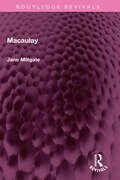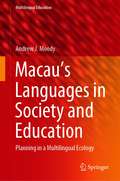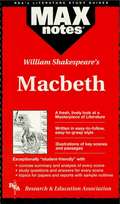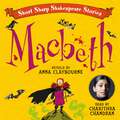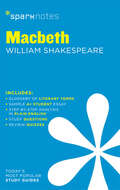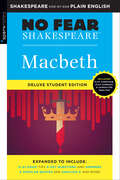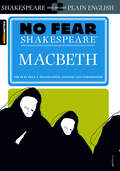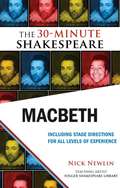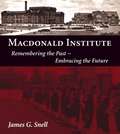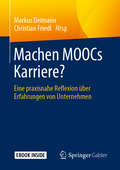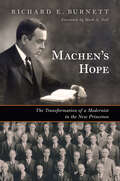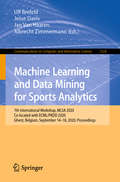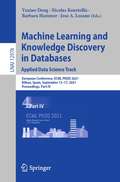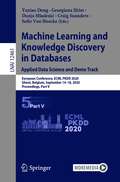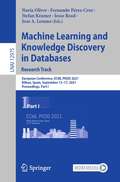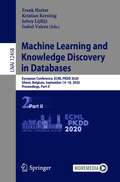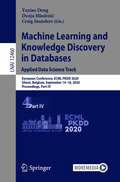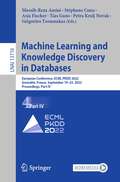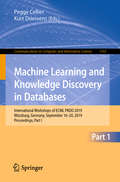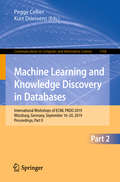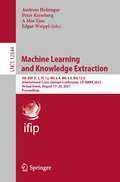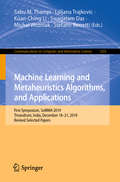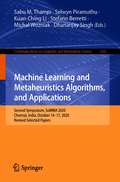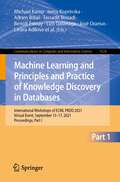- Table View
- List View
Macaulay (Routledge Revivals)
by Jane MillgateFirst published in 1973 Macaulay explores important aspects of the interrelationship between Macaulay’s literary and political careers, sets his achievements as an author within the context of his achievements as a public man, and examines some of the sources of his popularity and success. In doing so, it draws extensively on Macaulay’s journals and other papers at Trinity College, Cambridge and elsewhere. The emphases of the book are critical, not biographical, its essential aims the exploration of the range and quality of Macaulay’s writing and the demonstration of the validity of continuing to approach him- above all in mature essays and the History of England - as a narrative artist. This book is a must read for students of education, history of education, and British history.
Macau’s Languages in Society and Education: Planning in a Multilingual Ecology (Multilingual Education #39)
by Andrew J. MoodyThis book examines the role of English within education and society in the quickly changing city of Macau. Macau’s multilingual language ecology offers the unique opportunity to examine language planning and policy issues within a small speech community. The languages within the ecology include several Chinese varieties, such as Cantonese, Putonghua and Hokkien, European languages like Portuguese and English, and a number of Asian languages that include, among others, Burmese, Filipino languages, Japanese, Timorese, etc. As the smallest city in South China's Pearl River Delta, Macau has sought to maintain cultural and linguistic independence from its larger neighbours, and independence has been built upon an historic commitment to multilingualism and cultural plurality. As economic development and globalisation offer new opportunities to a growing middle class, the sociolinguistics of a small society constrain and influence the language policies that the territory seeks to implement. Macau's multilingual and pluralistic response to language needs within the territory echoes historical responses to similar challenges and suggests that small communities function sociolinguistically in ways that differ from larger communities.
Macbeth (MAXNotes Literature Guides)
by Rebecca SheinbergREA's MAXnotes for William Shakespeare's Macbeth The MAXnotes offers a comprehensive summary and analysis of Macbeth and a biography of William Shakespeare. Places the events of the play in historical context and discusses each act in detail. Includes study questions and answers along with topics for papers and sample outlines.
Macbeth (Short, Sharp Shakespeare Stories #25)
by Anna ClaybourneIs this a dagger which I see before me...?A power-hungry general, his crazed wife, three interfering witches and some terrifying ghosts... Listen on, through murder and mayhem, to discover the gripping story of Macbeth, one of Shakespeare's most famous tragedies.As well as the story, this audiobook contains information about the background to Macbeth, its major themes, language, and Shakespeare's life during the time he was writing the play. Witches and witchcraft in 16th century England are also examined, to give the context in which the play was written. The Short, Sharp Shakespeare series consists of six books that retell Shakespeare's most famous plays in modern English. Fun sound effects and atmospheric music accompany each narration, making them a great introduction to "the Bard" for children.(P) 2023 Hodder & Stoughton Limited
Macbeth SparkNotes Literature Guide (SparkNotes Literature Guide Series #43)
by SparkNotesMacbeth SparkNotes Literature Guide by William Shakespeare Making the reading experience fun! When a paper is due, and dreaded exams loom, here's the lit-crit help students need to succeed! SparkNotes Literature Guides make studying smarter, better, and faster. They provide chapter-by-chapter analysis; explanations of key themes, motifs, and symbols; a review quiz; and essay topics. Lively and accessible, SparkNotes is perfect for late-night studying and paper writing. Includes:An A+ Essay—an actual literary essay written about the Spark-ed book—to show students how a paper should be written.16 pages devoted to writing a literary essay including: a glossary of literary termsStep-by-step tutoring on how to write a literary essayA feature on how not to plagiarize
Macbeth: Modern English Version Side-by-side With Full Original Text (Shakespeare Made Easy)
by William ShakespeareHere are the books that help teach Shakespeare plays without the teacher constantly needing to explain and define Elizabethan terms, slang, and other ways of expression that are different from our own. Each play is presented with Shakespeare's original lines on each left-hand page, and a modern, easy-to-understand "translation" on the facing right-hand page. All dramas are complete, with every original Shakespearian line, and a full-length modern rendition of the text. Helpful background information that puts each play in its historical perspective. Discussion questions that teachers can use to spark student class participation, and which students can use as springboards for their own themes and term papers. Fact quizzes, sample examinations, and other features that improve student comprehension of what each play is about.
Macbeth: No Fear Shakespeare Deluxe Student Editions - Shakespeare Side-by-Side Plain English (No Fear Shakespeare)
by William Shakespeare SparkNotesShakespeare everyone can understand—now in this new EXPANDED edition of MACBETH! Why fear Shakespeare? By placing the words of the original play next to line-by-line translations in plain English, this popular guide makes Shakespeare accessible to everyone. And now it features expanded literature guide sections that help students study smarter. The expanded sections include: Five Key Questions: Five frequently asked questions about major moments and characters in the play. What Does the Ending Mean?: Is the ending sad, celebratory, ironic . . . or ambivalent? Plot Analysis: What is the play about? How is the story told, and what are the main themes? Why do the characters behave as they do? Study Questions: Questions that guide students as they study for a test or write a paper. Quotes by Theme: Quotes organized by Shakespeare&’s main themes, such as love, death, tyranny, honor, and fate. Quotes by Character: Quotes organized by the play&’s main characters, along with interpretations of their meaning.
Macbeth: No Fear Shakespeare Side-by-Side Plain English (No Fear Shakespeare)
by William Shakespeare SparkNotesThis No Fear Shakespeare ebook gives you the complete text of Macbeth and an easy-to-understand translation.Each No Fear Shakespeare containsThe complete text of the original playA line-by-line translation that puts Shakespeare into everyday languageA complete list of characters with descriptionsPlenty of helpful commentary
Macbeth: The 30-Minute Shakespeare
by Nick NewlinPlanning a school or amateur Shakespeare production? The best way to experience the plays is to perform them, but getting started can be a challenge: The complete plays are too long and complex, while scene selections or simplified language are too limited."The 30-Minute Shakespeare" is a new series of abridgements that tell the "story" of each play from start to finish while keeping the beauty of Shakespeare's language intact. Specific stage directions and character suggestions give even inexperienced actors the tools to perform Shakespeare with confidence, understanding, and fun!This cutting of MACBETH is edited to seven key scenes, opening with the Weird Sisters predicting Macbeth's fate. Also included are Macbeth and his villainous wife plotting to murder King Duncan, the appearance of Banquo's ghost at the banquet, the Witches' unforgettable "double double toil and trouble" scene, and Lady Macbeth's riveting "out, damned spot" sleepwalk. In the finale, the entire cast recites Macbeth's poignant "tomorrow, tomorrow, and tomorrow" speech in unison.The edition also includes an essay by editor Nick Newlin on how to produce a Shakespeare play with novice actors, and notes about the original production of this abridgement at the Folger Shakespeare Library's annual Student Shakespeare Festival.
Macdonald Institute
by James SnellMacdonald Institute traces the evolution of a small post-secondary institution specializing in the education of rural Ontario women into a world-respected, co-educational college at the University of Guelph. Built in 1903 with funds from Sir William Macdonald of Montreal, Macdonald Institute focused originally on the teaching of Domestic Science to rural women. "Mac" has evolved to meet the changing needs of women, the Canadian family and society in general. The Institute evolved into the College of Family and Consumer Studies in 1970 and its legacy is now an integral part of the College of Social and Applied Human Sciences. This book provides valuable insights into the education of women in Ontario in the twentieth century.
Machen MOOCs Karriere?: Eine praxisnahe Reflexion über Erfahrungen von Unternehmen
by Christian Friedl Markus DeimannImmer mehr Unternehmen entdecken Massive Open Online Courses, kurz: MOOCs als Format für Aus- und Weiterbildung, Training, Rekrutierung und Onboarding. Sind MOOCs ein valides Modell für eine zukunftsfähige, betriebliche Weiterbildung? Können sie die formale Wissensvermittlung in Form von Seminaren, Kursen und Web-based Trainings ergänzen? Bieten sie Möglichkeiten, um Mitarbeiter mit sich ändernden Bedürfnissen und ihre Erfahrungen über dieses Format zu mobilisieren und zu skalieren?Dieses Buch bietet einen praxisnahen Überblick zu Vorreitern im deutschsprachigen RaumUnternehmen wie die Credit Suisse, Telekom, SAP, Audi, Erste Bank und andere haben bereits interne MOOCs durchgeführt und teilen ihre Erfahrungen mit den Lesern. Die Beiträge bieten unterschiedliche Einblicke, etwa wie ein Firmeninternes soziales Netzwerk in eine Lern-Community umgewandelt wurde, wie Ausbildungsverantwortliche und Fachtrainer auf eine MOOC-Lernreise geschickt wurden und wie unterschiedliche didaktische Ansätze probiert und reflektiert wurden. Darauf aufbauend wird ein Ausblick auf aktuelle Trends und Entwicklungen in diesem Feld angestellt.
Machen's Hope: The Transformation of a Modernist in the New Princeton
by Richard E. BurnettThe first critical biography of J. Gresham Machen, examining the full arc of his intellectual career J. Gresham Machen is known as a conservative hero of the fundamentalist-modernist controversy. But was he always so staunchly antimodernist? In this sweeping new biography, Richard E. Burnett examines the whole of Machen&’s life and career—from his early years at Princeton, to his experience in the First World War, to his founding of Westminster Theological Seminary . Burnett pays special attention to topics that have received little attention from biographers, like Machen&’s crisis of faith and his support for historical criticism of Scripture. Incorporating all of Machen&’s major works as well as his previously unpublished private correspondence, Burnett crafts a nuanced narrative of Machen&’s intellectual journey from enthusiastic modernist to stalwart conservative. Nuanced and thorough, Machen&’s Hope will challenge scholars&’ assumptions about Machen and his dynamic era.
Machine Learning and Data Mining for Sports Analytics: 7th International Workshop, MLSA 2020, Co-located with ECML/PKDD 2020, Ghent, Belgium, September 14–18, 2020, Proceedings (Communications in Computer and Information Science #1324)
by Jesse Davis Ulf Brefeld Jan Van Haaren Albrecht ZimmermannThis book constitutes the refereed post-conference proceedings of the 7th International Workshop on Machine Learning and Data Mining for Sports Analytics, MLSA 2020, colocated with ECML/PKDD 2020, in Ghent, Belgium, in September 2020. Due to the COVID-19 pandemic the conference was held online. The 11 papers presented were carefully reviewed and selected from 22 submissions. The papers present a variety of topics within the area of sports analytics, including tactical analysis, outcome predictions, data acquisition, performance optimization, and player evaluation.
Machine Learning and Knowledge Discovery in Databases. Applied Data Science Track: European Conference, ECML PKDD 2021, Bilbao, Spain, September 13–17, 2021, Proceedings, Part IV (Lecture Notes in Computer Science #12978)
by Barbara Hammer Yuxiao Dong Jose A. Lozano Nicolas KourtellisThe multi-volume set LNAI 12975 until 12979 constitutes the refereed proceedings of the European Conference on Machine Learning and Knowledge Discovery in Databases, ECML PKDD 2021, which was held during September 13-17, 2021. The conference was originally planned to take place in Bilbao, Spain, but changed to an online event due to the COVID-19 pandemic. The 210 full papers presented in these proceedings were carefully reviewed and selected from a total of 869 submissions. The volumes are organized in topical sections as follows: Research Track: Part I: Online learning; reinforcement learning; time series, streams, and sequence models; transfer and multi-task learning; semi-supervised and few-shot learning; learning algorithms and applications. Part II: Generative models; algorithms and learning theory; graphs and networks; interpretation, explainability, transparency, safety. Part III: Generative models; search and optimization; supervised learning; text mining and natural language processing; image processing, computer vision and visual analytics. Applied Data Science Track: Part IV: Anomaly detection and malware; spatio-temporal data; e-commerce and finance; healthcare and medical applications (including Covid); mobility and transportation. Part V: Automating machine learning, optimization, and feature engineering; machine learning based simulations and knowledge discovery; recommender systems and behavior modeling; natural language processing; remote sensing, image and video processing; social media.
Machine Learning and Knowledge Discovery in Databases. Applied Data Science and Demo Track: European Conference, ECML PKDD 2020, Ghent, Belgium, September 14–18, 2020, Proceedings, Part V (Lecture Notes in Computer Science #12461)
by Dunja Mladenić Georgiana Ifrim Yuxiao Dong Craig Saunders Sofie Van HoeckeThe 5-volume proceedings, LNAI 12457 until 12461 constitutes the refereed proceedings of the European Conference on Machine Learning and Knowledge Discovery in Databases, ECML PKDD 2020, which was held during September 14-18, 2020. The conference was planned to take place in Ghent, Belgium, but had to change to an online format due to the COVID-19 pandemic.The 232 full papers and 10 demo papers presented in this volume were carefully reviewed and selected for inclusion in the proceedings. The volumes are organized in topical sections as follows: Part I: Pattern Mining; clustering; privacy and fairness; (social) network analysis and computational social science; dimensionality reduction and autoencoders; domain adaptation; sketching, sampling, and binary projections; graphical models and causality; (spatio-) temporal data and recurrent neural networks; collaborative filtering and matrix completion. Part II: deep learning optimization and theory; active learning; adversarial learning; federated learning; Kernel methods and online learning; partial label learning; reinforcement learning; transfer and multi-task learning; Bayesian optimization and few-shot learning. Part III: Combinatorial optimization; large-scale optimization and differential privacy; boosting and ensemble methods; Bayesian methods; architecture of neural networks; graph neural networks; Gaussian processes; computer vision and image processing; natural language processing; bioinformatics. Part IV: applied data science: recommendation; applied data science: anomaly detection; applied data science: Web mining; applied data science: transportation; applied data science: activity recognition; applied data science: hardware and manufacturing; applied data science: spatiotemporal data. Part V: applied data science: social good; applied data science: healthcare; applied data science: e-commerce and finance; applied data science: computational social science; applied data science: sports; demo track.
Machine Learning and Knowledge Discovery in Databases. Research Track: European Conference, ECML PKDD 2021, Bilbao, Spain, September 13–17, 2021, Proceedings, Part I (Lecture Notes in Computer Science #12975)
by Jesse Read Nuria Oliver Stefan Kramer Jose A. Lozano Fernando Pérez-CruzThe multi-volume set LNAI 12975 until 12979 constitutes the refereed proceedings of the European Conference on Machine Learning and Knowledge Discovery in Databases, ECML PKDD 2021, which was held during September 13-17, 2021. The conference was originally planned to take place in Bilbao, Spain, but changed to an online event due to the COVID-19 pandemic. The 210 full papers presented in these proceedings were carefully reviewed and selected from a total of 869 submissions. The volumes are organized in topical sections as follows: Research Track: Part I: Online learning; reinforcement learning; time series, streams, and sequence models; transfer and multi-task learning; semi-supervised and few-shot learning; learning algorithms and applications. Part II: Generative models; algorithms and learning theory; graphs and networks; interpretation, explainability, transparency, safety. Part III: Generative models; search and optimization; supervised learning; text mining and natural language processing; image processing, computer vision and visual analytics. Applied Data Science Track: Part IV: Anomaly detection and malware; spatio-temporal data; e-commerce and finance; healthcare and medical applications (including Covid); mobility and transportation. Part V: Automating machine learning, optimization, and feature engineering; machine learning based simulations and knowledge discovery; recommender systems and behavior modeling; natural language processing; remote sensing, image and video processing; social media.
Machine Learning and Knowledge Discovery in Databases: European Conference, ECML PKDD 2020, Ghent, Belgium, September 14–18, 2020, Proceedings, Part II (Lecture Notes in Computer Science #12458)
by Kristian Kersting Frank Hutter Jefrey Lijffijt Isabel ValeraThe 5-volume proceedings, LNAI 12457 until 12461 constitutes the refereed proceedings of the European Conference on Machine Learning and Knowledge Discovery in Databases, ECML PKDD 2020, which was held during September 14-18, 2020. The conference was planned to take place in Ghent, Belgium, but had to change to an online format due to the COVID-19 pandemic.The 232 full papers and 10 demo papers presented in this volume were carefully reviewed and selected for inclusion in the proceedings. The volumes are organized in topical sections as follows: Part I: Pattern Mining; clustering; privacy and fairness; (social) network analysis and computational social science; dimensionality reduction and autoencoders; domain adaptation; sketching, sampling, and binary projections; graphical models and causality; (spatio-) temporal data and recurrent neural networks; collaborative filtering and matrix completion. Part II: deep learning optimization and theory; active learning; adversarial learning; federated learning; Kernel methods and online learning; partial label learning; reinforcement learning; transfer and multi-task learning; Bayesian optimization and few-shot learning. Part III: Combinatorial optimization; large-scale optimization and differential privacy; boosting and ensemble methods; Bayesian methods; architecture of neural networks; graph neural networks; Gaussian processes; computer vision and image processing; natural language processing; bioinformatics. Part IV: applied data science: recommendation; applied data science: anomaly detection; applied data science: Web mining; applied data science: transportation; applied data science: activity recognition; applied data science: hardware and manufacturing; applied data science: spatiotemporal data. Part V: applied data science: social good; applied data science: healthcare; applied data science: e-commerce and finance; applied data science: computational social science; applied data science: sports; demo track.
Machine Learning and Knowledge Discovery in Databases: European Conference, ECML PKDD 2020, Ghent, Belgium, September 14–18, 2020, Proceedings, Part IV (Lecture Notes in Computer Science #12460)
by Dunja Mladenić Yuxiao Dong Craig SaundersThe 5-volume proceedings, LNAI 12457 until 12461 constitutes the refereed proceedings of the European Conference on Machine Learning and Knowledge Discovery in Databases, ECML PKDD 2020, which was held during September 14-18, 2020. The conference was planned to take place in Ghent, Belgium, but had to change to an online format due to the COVID-19 pandemic.The 232 full papers and 10 demo papers presented in this volume were carefully reviewed and selected for inclusion in the proceedings. The volumes are organized in topical sections as follows: Part I: Pattern Mining; clustering; privacy and fairness; (social) network analysis and computational social science; dimensionality reduction and autoencoders; domain adaptation; sketching, sampling, and binary projections; graphical models and causality; (spatio-) temporal data and recurrent neural networks; collaborative filtering and matrix completion. Part II: deep learning optimization and theory; active learning; adversarial learning; federated learning; Kernel methods and online learning; partial label learning; reinforcement learning; transfer and multi-task learning; Bayesian optimization and few-shot learning. Part III: Combinatorial optimization; large-scale optimization and differential privacy; boosting and ensemble methods; Bayesian methods; architecture of neural networks; graph neural networks; Gaussian processes; computer vision and image processing; natural language processing; bioinformatics. Part IV: applied data science: recommendation; applied data science: anomaly detection; applied data science: Web mining; applied data science: transportation; applied data science: activity recognition; applied data science: hardware and manufacturing; applied data science: spatiotemporal data. Part V: applied data science: social good; applied data science: healthcare; applied data science: e-commerce and finance; applied data science: computational social science; applied data science: sports; demo track.
Machine Learning and Knowledge Discovery in Databases: European Conference, ECML PKDD 2022, Grenoble, France, September 19–23, 2022, Proceedings, Part IV (Lecture Notes in Computer Science #13716)
by Massih-Reza Amini Petra Kralj Novak Grigorios Tsoumakas Stéphane Canu Asja Fischer Tias GunsThe multi-volume set LNAI 13713 until 13718 constitutes the refereed proceedings of the European Conference on Machine Learning and Knowledge Discovery in Databases, ECML PKDD 2022, which took place in Grenoble, France, in September 2022.The 236 full papers presented in these proceedings were carefully reviewed and selected from a total of 1060 submissions. In addition, the proceedings include 17 Demo Track contributions. The volumes are organized in topical sections as follows: Part I: Clustering and dimensionality reduction; anomaly detection; interpretability and explainability; ranking and recommender systems; transfer and multitask learning; Part II: Networks and graphs; knowledge graphs; social network analysis; graph neural networks; natural language processing and text mining; conversational systems; Part III: Deep learning; robust and adversarial machine learning; generative models; computer vision; meta-learning, neural architecture search; Part IV: Reinforcement learning; multi-agent reinforcement learning; bandits and online learning; active and semi-supervised learning; private and federated learning; Part V: Supervised learning; probabilistic inference; optimal transport; optimization; quantum, hardware; sustainability; Part VI: Time series; financial machine learning; applications; applications: transportation; demo track.
Machine Learning and Knowledge Discovery in Databases: International Workshops of ECML PKDD 2019, Würzburg, Germany, September 16–20, 2019, Proceedings, Part I (Communications in Computer and Information Science #1167)
by Peggy Cellier Kurt DriessensThis two-volume set constitutes the refereed proceedings of the workshops which complemented the 19th Joint European Conference on Machine Learning and Knowledge Discovery in Databases, ECML PKDD, held in Würzburg, Germany, in September 2019. The 70 full papers and 46 short papers presented in the two-volume set were carefully reviewed and selected from 200 submissions. The two volumes (CCIS 1167 and CCIS 1168) present the papers that have been accepted for the following workshops: Workshop on Automating Data Science, ADS 2019; Workshop on Advances in Interpretable Machine Learning and Artificial Intelligence and eXplainable Knowledge Discovery in Data Mining, AIMLAI-XKDD 2019; Workshop on Decentralized Machine Learning at the Edge, DMLE 2019; Workshop on Advances in Managing and Mining Large Evolving Graphs, LEG 2019; Workshop on Data and Machine Learning Advances with Multiple Views; Workshop on New Trends in Representation Learning with Knowledge Graphs; Workshop on Data Science for Social Good, SoGood 2019; Workshop on Knowledge Discovery and User Modelling for Smart Cities, UMCIT 2019; Workshop on Data Integration and Applications Workshop, DINA 2019; Workshop on Machine Learning for Cybersecurity, MLCS 2019; Workshop on Sports Analytics: Machine Learning and Data Mining for Sports Analytics, MLSA 2019; Workshop on Categorising Different Types of Online Harassment Languages in Social Media; Workshop on IoT Stream for Data Driven Predictive Maintenance, IoTStream 2019; Workshop on Machine Learning and Music, MML 2019; Workshop on Large-Scale Biomedical Semantic Indexing and Question Answering, BioASQ 2019.
Machine Learning and Knowledge Discovery in Databases: International Workshops of ECML PKDD 2019, Würzburg, Germany, September 16–20, 2019, Proceedings, Part II (Communications in Computer and Information Science #1168)
by Peggy Cellier Kurt DriessensThis two-volume set constitutes the refereed proceedings of the workshops which complemented the 19th Joint European Conference on Machine Learning and Knowledge Discovery in Databases, ECML PKDD, held in Würzburg, Germany, in September 2019. The 70 full papers and 46 short papers presented in the two-volume set were carefully reviewed and selected from 200 submissions. The two volumes (CCIS 1167 and CCIS 1168) present the papers that have been accepted for the following workshops: Workshop on Automating Data Science, ADS 2019; Workshop on Advances in Interpretable Machine Learning and Artificial Intelligence and eXplainable Knowledge Discovery in Data Mining, AIMLAI-XKDD 2019; Workshop on Decentralized Machine Learning at the Edge, DMLE 2019; Workshop on Advances in Managing and Mining Large Evolving Graphs, LEG 2019; Workshop on Data and Machine Learning Advances with Multiple Views; Workshop on New Trends in Representation Learning with Knowledge Graphs; Workshop on Data Science for Social Good, SoGood 2019; Workshop on Knowledge Discovery and User Modelling for Smart Cities, UMCIT 2019; Workshop on Data Integration and Applications Workshop, DINA 2019; Workshop on Machine Learning for Cybersecurity, MLCS 2019; Workshop on Sports Analytics: Machine Learning and Data Mining for Sports Analytics, MLSA 2019; Workshop on Categorising Different Types of Online Harassment Languages in Social Media; Workshop on IoT Stream for Data Driven Predictive Maintenance, IoTStream 2019; Workshop on Machine Learning and Music, MML 2019; Workshop on Large-Scale Biomedical Semantic Indexing and Question Answering, BioASQ 2019.
Machine Learning and Knowledge Extraction: 5th IFIP TC 5, TC 12, WG 8.4, WG 8.9, WG 12.9 International Cross-Domain Conference, CD-MAKE 2021, Virtual Event, August 17–20, 2021, Proceedings (Lecture Notes in Computer Science #12844)
by Andreas Holzinger Edgar Weippl A Min Tjoa Peter KiesebergThis book constitutes the refereed proceedings of the 5th IFIP TC 5, TC 12, WG 8.4, WG 8.9, WG 12.9 International Cross-Domain Conference, CD-MAKE 2021, held in virtually in August 2021.The 20 full papers and 2 short papers presented were carefully reviewed and selected from 48 submissions. The cross-domain integration and appraisal of different fields provides an atmosphere to foster different perspectives and opinions; it will offer a platform for novel ideas and a fresh look on the methodologies to put these ideas into business for the benefit of humanity.
Machine Learning and Metaheuristics Algorithms, and Applications: First Symposium, SoMMA 2019, Trivandrum, India, December 18–21, 2019, Revised Selected Papers (Communications in Computer and Information Science #1203)
by Kuan-Ching Li Swagatam Das Sabu M. Thampi Michal Wozniak Stefano Berretti Ljiljana TrajkovicThis book constitutes the refereed proceedings of the First Symposium on Machine Learning and Metaheuristics Algorithms, and Applications, held in Trivandrum, India, in December 2019.The 17 full papers and 6 short papers presented in this volume were thoroughly reviewed and selected from 53 qualified submissions. The papers cover such topics as machine learning, artificial intelligence, Internet of Things, modeling and simulation, disctibuted computing methodologies, computer graphics, etc.
Machine Learning and Metaheuristics Algorithms, and Applications: Second Symposium, SoMMA 2020, Chennai, India, October 14–17, 2020, Revised Selected Papers (Communications in Computer and Information Science #1366)
by Selwyn Piramuthu Kuan-Ching Li Sabu M. Thampi Michal Wozniak Stefano Berretti Dhananjay SinghThis book constitutes the refereed proceedings of the Second Symposium on Machine Learning and Metaheuristics Algorithms, and Applications, SoMMA 2020, held in Chennai, India, in October 2020. Due to the COVID-19 pandemic the conference was held online. The 12 full papers and 7 short papers presented in this volume were thoroughly reviewed and selected from 40 qualified submissions. The papers cover such topics as machine learning, artificial intelligence, Internet of Things, modeling and simulation, disctibuted computing methodologies, computer graphics, etc.
Machine Learning and Principles and Practice of Knowledge Discovery in Databases: International Workshops of ECML PKDD 2021, Virtual Event, September 13-17, 2021, Proceedings, Part I (Communications in Computer and Information Science #1524)
by Christopher Buckley Min Zhou Lee Cooper Rita Ribeiro Donato Malerba Bodo Rosenhahn João Gama Riccardo Guidotti Anna Monreale Pedro M. Ferreira Meng Sun Philippe Fournier-Viger Ricard Gavaldà Michael Kamp Yamuna Krishnamurthy Valerio Bitetta Ilaria Bordino Andrea Ferretti Francesco Gullo Christine Largeron Massimiliano Ruocco Giovanni Ponti Tim Verbelen Pablo Lanillos Holger Fröning Franz Pernkopf Gregor Schiele Michaela Blott Lorenzo Severini Przemyslaw Biecek Irena Koprinska Linara Adilova Ibéria Medeiros Eirini Ntoutsi Salvatore Rinzivillo Jefrey Lijffijt Adrien Bibal Tassadit Bouadi Benoît Frénay Luis Galárraga José Oramas Bo Kang Tiphaine Viard Pascal Welke Erlend Aune Claudio Gallicchio Günther Schindler Mykola Pechenizkiy Daniela Cialfi Maxwell Ramstead Giuseppina Andresini M. Saqib Nawaz Sebastian Ventura Naghmeh Ghazaleh Jonas Richiardi Damian Roqueiro Diego Saldana Miranda Konstantinos Sechidis Guilherme GraçaThis two-volume set constitutes the refereed proceedings of the workshops which complemented the 21th Joint European Conference on Machine Learning and Knowledge Discovery in Databases, ECML PKDD, held in September 2021. Due to the COVID-19 pandemic the conference and workshops were held online. The 104 papers were thoroughly reviewed and selected from 180 papers submited for the workshops. This two-volume set includes the proceedings of the following workshops:Workshop on Advances in Interpretable Machine Learning and Artificial Intelligence (AIMLAI 2021)Workshop on Parallel, Distributed and Federated Learning (PDFL 2021)Workshop on Graph Embedding and Mining (GEM 2021)Workshop on Machine Learning for Irregular Time-series (ML4ITS 2021)Workshop on IoT, Edge, and Mobile for Embedded Machine Learning (ITEM 2021)Workshop on eXplainable Knowledge Discovery in Data Mining (XKDD 2021)Workshop on Bias and Fairness in AI (BIAS 2021)Workshop on Workshop on Active Inference (IWAI 2021)Workshop on Machine Learning for Cybersecurity (MLCS 2021)Workshop on Machine Learning in Software Engineering (MLiSE 2021)Workshop on MIning Data for financial applications (MIDAS 2021)Sixth Workshop on Data Science for Social Good (SoGood 2021)Workshop on Machine Learning for Pharma and Healthcare Applications (PharML 2021)Second Workshop on Evaluation and Experimental Design in Data Mining and Machine Learning (EDML 2020)Workshop on Machine Learning for Buildings Energy Management (MLBEM 2021)
